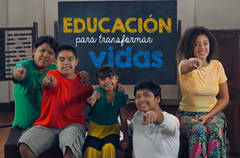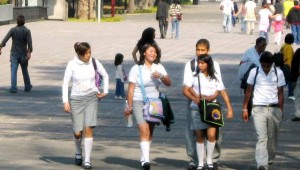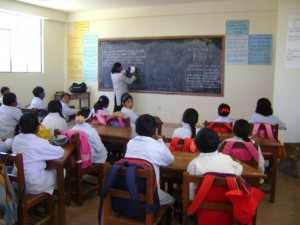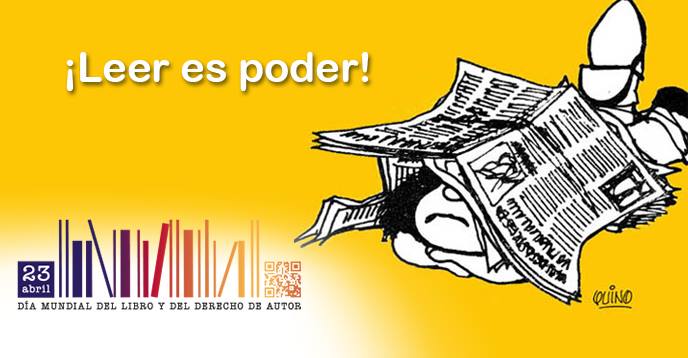Africa/Nigeria/Abril 2016/Autor: Koko Kalango/ Fuente: allafrica.com
Resumen: Ayer, 23 de abril, fue día Mundial del Libro y del Derecho de Autor, según lo señalado por las Naciones Unidas. En ese día, hace dos años, Port Harcourt, Nigeria se convirtió en la UNESCO Capital Mundial del Libro (WBCC). El título del WBCC es una «candidatura simbólica de una ciudad en reconocimiento de sus esfuerzos en la promoción del libro y la lectura». La ciudad asume este título de un Día Mundial del Libro y Derecho de Autor, durante el cual se ejecutan programas de promoción de la lectura para el desarrollo de la sociedad.
Yesterday, April 23, was World Book and Copyright Day, as designated by the United Nations. On that day, two years ago, Port Harcourt, Nigeria became UNESCO World Book Capital City (WBCC). The WBCC title is a ‘symbolic nomination to a city in recognition of its efforts in promoting books and reading’. The city holds this title from one World Book and Copyright Day to another, during which it executes programmes to promote reading for development of society.
Port Harcourt beat 10 cities,, including Oxford, to clinch the nomination, thus becoming Africa’s first WBCC to be nominated by public bid, sub-sahara Africa’s first WBCC and Africa’s second ever WBCC (Alexandria, Egypt was the first).
Nigeria became World Book Capital amidst mixed feelings of joy and grief. Nine days before this historic occasion, 276 girls were abducted from Government Secondary School Chibok, Borno State by Boko Haram, an Islamic extremist group that believes western education is evil.
It seemed ironical that the book was being brought to focus, against the backdrop of threat by a retrogressive and dangerous movement directly opposed to the ideals of the World Book Capital initiative.
The plight of the missing girls was given prominence by Nobel Laureate Professor Wole Soyinka, in his keynote address at the Port Harcourt World Book Capital opening ceremony where he called on the Nigerian government to ‘bring back the pupils’.
Soyinka’s alarm triggered off the now worldwide ‘Bring Back our Girls’ campaign that has had the participation of celebrities and international figures, including Malala Yousafzai, David Cameron and Michelle Obama.
Just over a week ago, on the second anniversary of this terrible incident, the attention of the world was on Nigeria and pressure continues to mount on our government to do all it can to ensure the safe return of the girls.
This threat to our education and security should challenge us to continue to work to rescue Nigeria from the grip of those who stand against the progress and liberty education brings. Nelson Mandela said, «Education is the most powerful weapon which you can use to change the world.»
His use of the word ‘weapon’ pre-supposes conflict and it aptly describes the situation with which we are faced where we have been drawn into a battle for the mind that is now resulting in a physical battle The Rainbow Book Club has been wielding the weapon of education for over a decade, culminating in it being instrumental to Port Harcourt’s nomination as World Book Capital City 2014.
In the course of that year, we organised over 23 distinct, carefully planned and well-executed programmes with far -reaching effect. Two hundred book clubs were established and run in 100 schools in the city, 12 ‘seed’ libraries were planted in indigent communities, and about 68,000 books were donated to over 100 school libraries. We engaged almost 1000 children and youth in various training sessions to improve their writing and reading skills, we celebrated over 73 authors on the national and international stage, we adapted six books for stage and had them performed, we produced 8 books- some of them being the work of aspiring writers; indeed, we projected Nigeria to the world through its literature.
On this World Book and Copyright Day, we are advocating for Madiba’s Change Agenda – Change through education.
To effect positive, sustainable change in Nigeria, we would have to pay more attention to non-formal and informal education.
I would use stories to buttress this point. If I choose to make my contributions to this important subject in a childlike way, please forgive me, I work with children. First, let me tell you about Arit and Boma, two people, who came into my life at about the same time. I have changed their names to protect their identity.
Boma was in her early 20s when I met her. Although, she had only a secondary school certificate, we employed her because she performed well in the job interview. As an office assistant, she was hardworking, honest and ran the office competently and efficiently. She also loved to read and it reflected in her good writing skills.
Arit was 18 when our paths crossed. She too was good at her job. She cleaned, as well as helped out with cooking and caring for our children. From time to time I would give her a simple book, such as Chinua Achebe’s Chike and the River or Cyprian Ekwensi’s Drummer Boy, to read. But she showed little interest in reading and as a result, she could not write a simple shopping list. To my utter shock she got admission into a Federal University and four years later, a degree in Marketing!
A Boma without a University degree would certainly add more value to the workplace and the wider society than an Arit who holds a questionable degree certificate. To move Nigeria forward, we would need to emphasize skill, competence, experience, and character over certificates.
I would not hide the identities of my next two examples. Gabriel attended the famous Government College, Umuahia, where he was exposed to music, literature and arts. He served in the Royal Air Force during the Second World War. He later taught and worked as a book binder. Through personal tuition, reflection and a deep interest in the literature, language and culture of his people, Gabriel became one of Africa’s most notable poets and the first African to win the Commonwealth Joint Poetry Award (1979). He later became General Manager of the Rivers State Newspaper Corporation and thereafter, Commissioner for Information. I am talking of Gabriel Okara. You may have noticed he did not have a university education. In those days our values were different.
Next is my own story. As a young girl, I learnt a lot about other societies and cultures through movies, books, games and even songs. The movie, The Sound of Music, made me love Salsburg, Austria, while giving me a glimpse into the devastating effects of the second World War on families and society at large. Mariama Ba’s book Une Si Longue Lettre made me appreciate the plight of women in polygamous marriages. The board game, Monopoly, introduced me to London’s real estate market. As a teenager I became curious about the details of the Vietnam war simply by listening to Paul Hardcastle’s 1985 rap song ’19’.
To move Nigeria forward we must exploit the power of informal and non- formal education.
With Nigeria’s literacy rate at 59.6 percent by a 2015 UNESCO survey, a reported 10.5 million children out of school according to a 2015 UNICEF submission, and poor standards of education, we must take the ‘Change Nigeria through Education’ agenda seriously. And this initiative is a collective responsibility. We all have a part to play, from our different platforms – the families, the faith based organisations, the market place, the mass media, civil society, the sports and entertainment industry, etc. Today, in our internet age, information, and therefore education opportunities are literarily at our finger tips.
In our various endeavours we must ask ourselves sincerely whether what we do builds or destroys the mind. Such a question would affect the Corporate Social Responsibilities of businesses, the priority of governments, the initiatives of all those who would sign up for this war. Our collective effort should translate into more edifying content on TV, radio, in music, drama, games, books, etc.
Finally, I would like to suggest that we set up community centres, which would have libraries in every Local Government Area (LGA) in Nigeria. I read of the intention of this administration to establish health centres in all the LGAs in Nigeria. As we make plans to take care of the body, let us also plan to cater for the mind. These proposed centres can become hubs where informal, non-formal and even formal education intentionally takes place. They would be platforms for expression of the performing, literary, and visual arts. Here, we can run book clubs, hold literacy and numeracy classes, exhibitions and other educational programmes.
Yesterday, I represented Nigeria in Wroclaw, Poland, as they took over as UNESCO World Book Capital 2016. I would be networking with other World Book Capitals to brainstorm and exchange ideas on how we can continue to use the book to build bridges between cultures and to build a better world.
I pray that Port Harcourt and Nigeria would not allow the opportunity that came our way with the 2014 World Book Capital programme go to waste. The programmes that were carried out during our tenure should be sustained and built upon by Rivers State, duplicated by other states and the ones that cut across states and nations should be kept alive by the Federal Government. Their contribution to the education landscape of our country would be priceless.
Bring back the book! Bring back our girls! Change Nigeria through education!
Fuente de la noticia: http://allafrica.com/stories/201604240103.html
Fuente de la imagen: https://www.google.co.ve/search?q=nigeria&espv=2&biw=1280&bih=895&source=lnms&tbm=isch&sa=X&ved=0ahUKEwjG-4ST66fMAhUDeCYKHVzZCQoQ_AUIBigB#imgrc=MMBggypeGfBi7M%3A



 México es un país que gasta en Educación el porcentaje recomendado. Pero no gasta del todo bien. La Reforma Constitucional de 2011, que establece la obligación del Estado de brindar Educación Media Superior a todo el que la solicite, requiere, obviamente, que el alumno haya terminado la Secundaria. Se estableció un artículo transitorio en esa Reforma, a fin de que para 2021 (diez años después de emitida), las autoridades mexicanas pudieran estar en condiciones de brindar un espacio a todos los jóvenes.
México es un país que gasta en Educación el porcentaje recomendado. Pero no gasta del todo bien. La Reforma Constitucional de 2011, que establece la obligación del Estado de brindar Educación Media Superior a todo el que la solicite, requiere, obviamente, que el alumno haya terminado la Secundaria. Se estableció un artículo transitorio en esa Reforma, a fin de que para 2021 (diez años después de emitida), las autoridades mexicanas pudieran estar en condiciones de brindar un espacio a todos los jóvenes.











 Users Today : 48
Users Today : 48 Total Users : 35460179
Total Users : 35460179 Views Today : 66
Views Today : 66 Total views : 3418849
Total views : 3418849